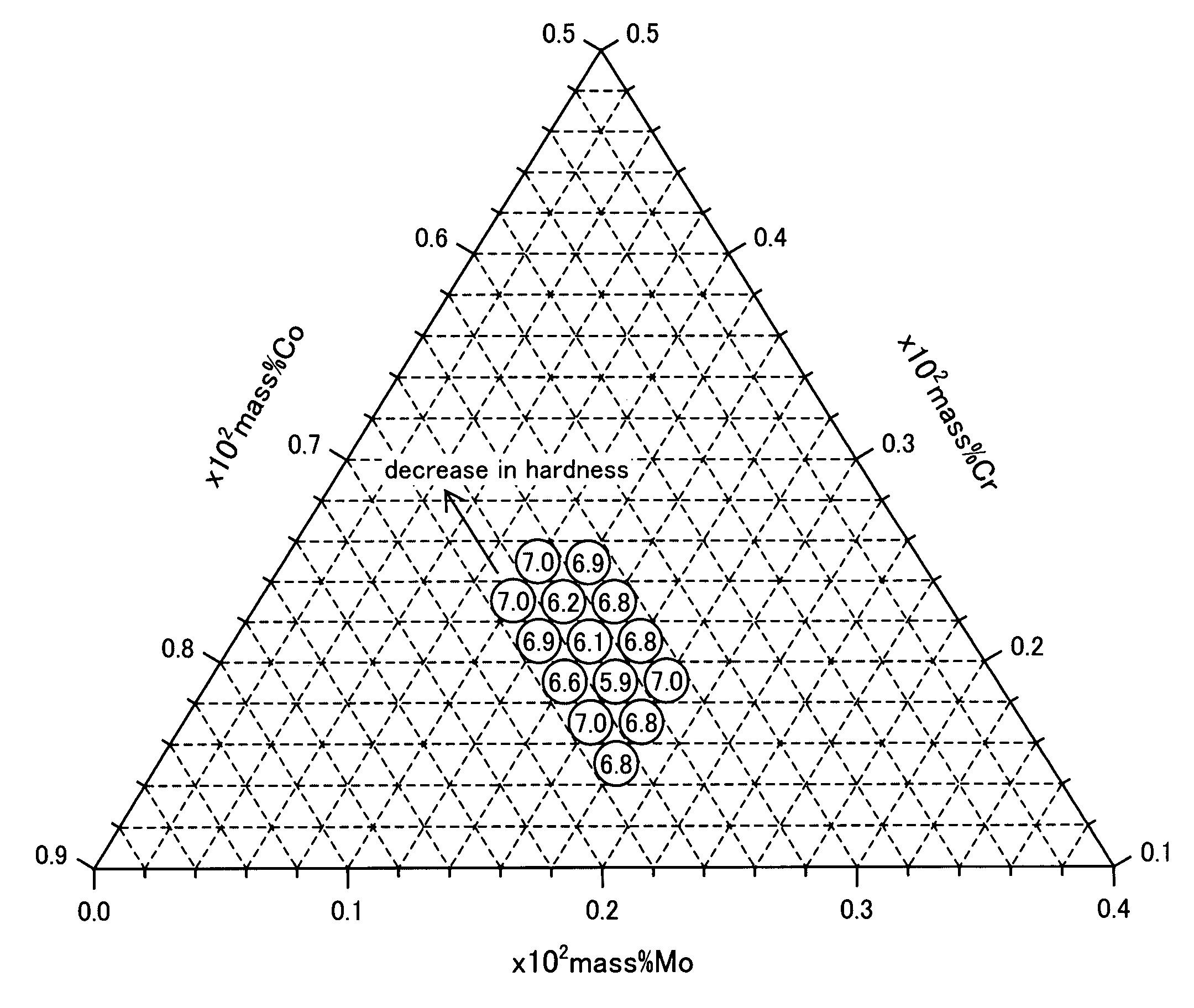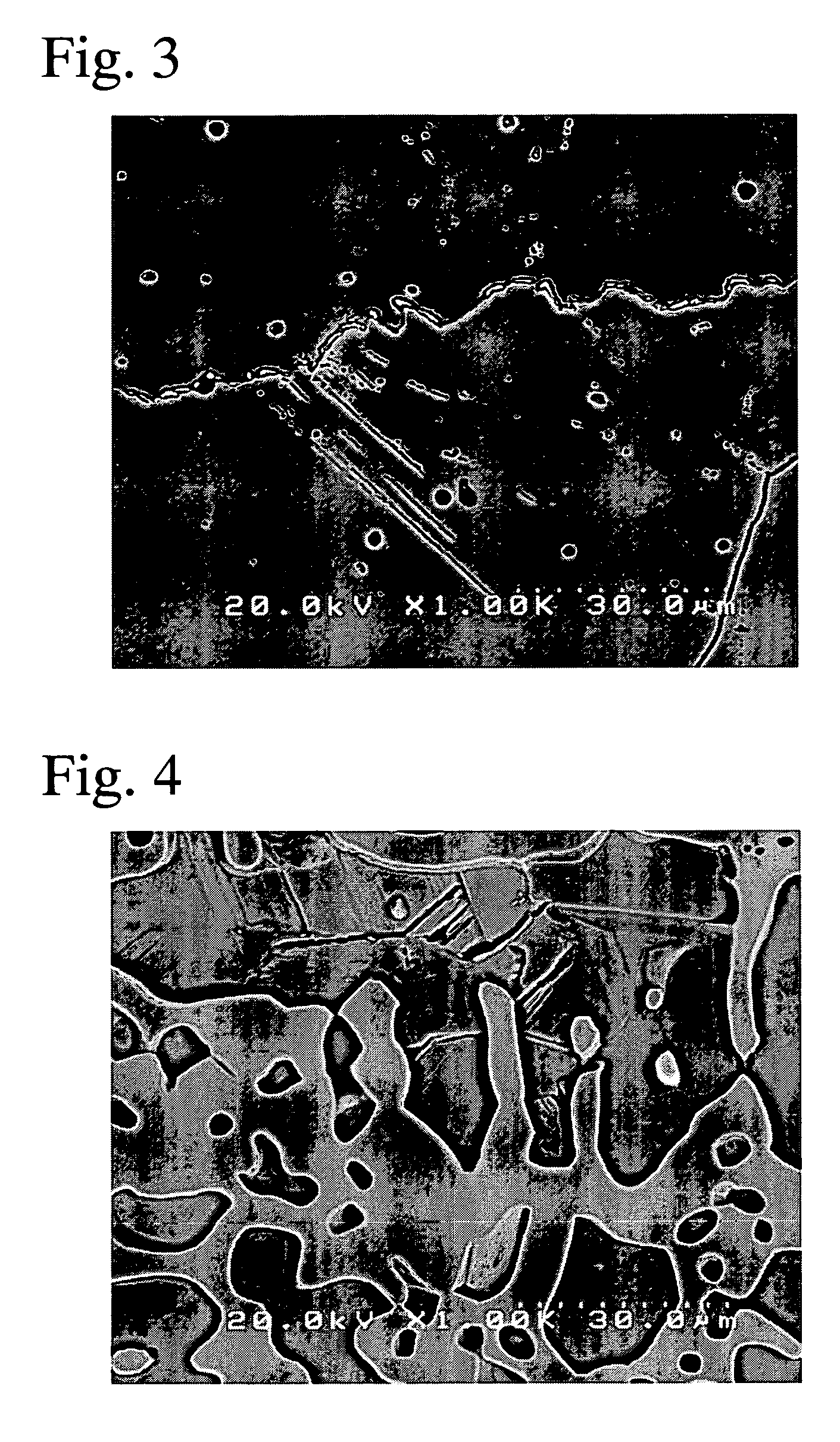Co-Cr-Mo-based alloy and production method therefor
a mo-based alloy and production method technology, applied in the field of co — cr — mo-based alloy production technique, can solve the problems of inconvenient mri diagnosis, difficult examination of mri or mri diagnosis, and inability to obtain image of the periphery of a member of the above alloy, etc., to achieve good vickers hardness and good magnetic susceptibility
- Summary
- Abstract
- Description
- Claims
- Application Information
AI Technical Summary
Benefits of technology
Problems solved by technology
Method used
Image
Examples
example 1
of the Alloy of the Present Invention
[0039]An as-cast material made by compounding and alloying 19 mass % of Cr, 16 mass % of Mo, and the balance of Co and inevitable impurities satisfied requirements of the composition in the first aspect of the present invention. However, the as-cast material had a Vickers hardness number (average of five measurement points) of 360 and a mass magnetic susceptibility of 10.8×4π·10−9 m3 / kg at room temperature, and had a dendrite structure having high unevenness of concentration. FIG. 1 is a reflecting electron (composition) image in SEM of an internal structure of the as-cast material. As shown in FIG. 1, an image at Mo-rich region of 100 μm2 in cross section is bright, and the area ratio thereof with respect to the matrix was alomost 8%. The as-cast material was subjected to heat treating at 1200 degrees C. for 3 hours in an Ar atmosphere, so that Example 1 of the alloy of the present invention was obtained. FIG. 2 is a reflecting electron (composi...
example 2
of the Alloy of the Present Invention
[0040]An as-cast material made by compounding and alloying 23 mass % of Cr, 12 mass % of Mo, and the balance of Co and inevitable impurities satisfied requirements of the composition in the first aspect of the present invention. The as-cast material was subjected to heat treating at 1200 degrees C. for 3 hours in an Ar atmosphere, so that the Example 2 of the alloy of the present invention was obtained. FIG. 3 is a reflecting electron (composition) image in SEM of an internal structure of the Example 2 of the alloy of the present invention. As shown in FIG. 3, a Mo-rich region (region which appears to be bright) was very small, and the area ratio thereof with respect to a matrix was 0.2%. The Example 2 of the alloy of the present invention had a Vickers hardness number (average of five measurement points) of 520 and a mass magnetic susceptibility of 6.2×4π·10×9 m3 / kg at room temperature.
PUM
| Property | Measurement | Unit |
|---|---|---|
| length | aaaaa | aaaaa |
| diameter | aaaaa | aaaaa |
| mass % | aaaaa | aaaaa |
Abstract
Description
Claims
Application Information
 Login to View More
Login to View More - R&D
- Intellectual Property
- Life Sciences
- Materials
- Tech Scout
- Unparalleled Data Quality
- Higher Quality Content
- 60% Fewer Hallucinations
Browse by: Latest US Patents, China's latest patents, Technical Efficacy Thesaurus, Application Domain, Technology Topic, Popular Technical Reports.
© 2025 PatSnap. All rights reserved.Legal|Privacy policy|Modern Slavery Act Transparency Statement|Sitemap|About US| Contact US: help@patsnap.com



